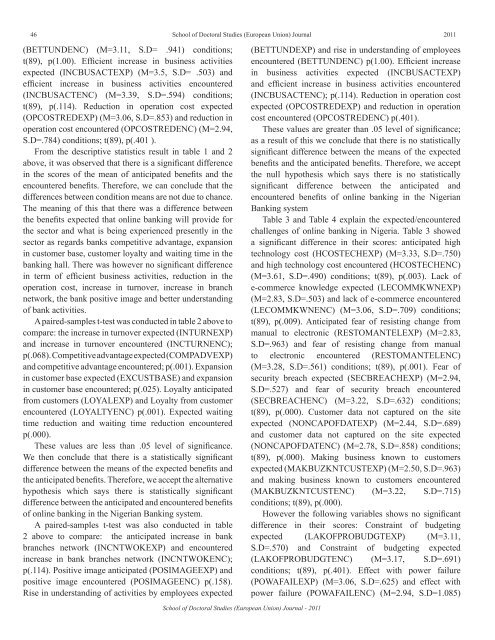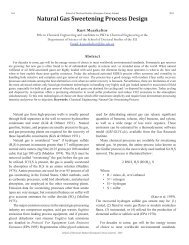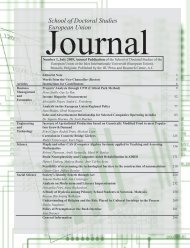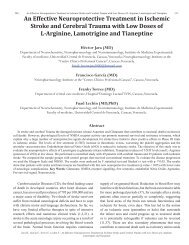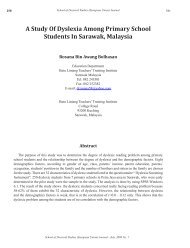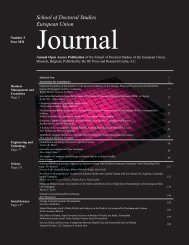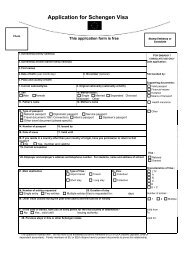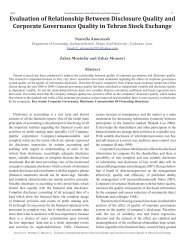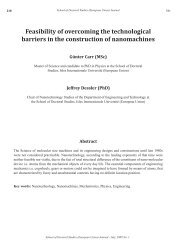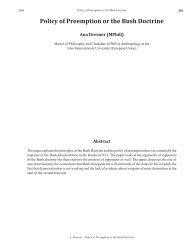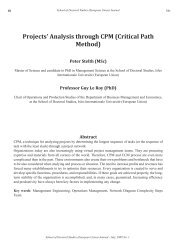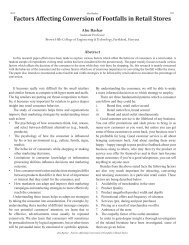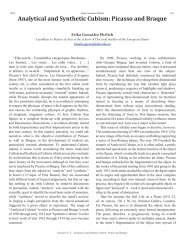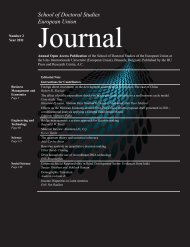Iiuedu.eu
Iiuedu.eu
Iiuedu.eu
You also want an ePaper? Increase the reach of your titles
YUMPU automatically turns print PDFs into web optimized ePapers that Google loves.
46 School of Doctoral Studies (European Union) Journal2011(BETTUNDENC) (M=3.11, S.D= .941) conditions;t(89), p(1.00). Efficient increase in business activitiesexpected (INCBUSACTEXP) (M=3.5, S.D= .503) andefficient increase in business activities encountered(INCBUSACTENC) (M=3.39, S.D=.594) conditions;t(89), p(.114). Reduction in operation cost expected(OPCOSTREDEXP) (M=3.06, S.D=.853) and reduction inoperation cost encountered (OPCOSTREDENC) (M=2.94,S.D=.784) conditions; t(89), p(.401 ).From the descriptive statistics result in table 1 and 2above, it was observed that there is a significant differencein the scores of the mean of anticipated benefits and theencountered benefits. Therefore, we can conclude that thedifferences between condition means are not due to chance.The meaning of this that there was a difference betweenthe benefits expected that online banking will provide forthe sector and what is being experienced presently in thesector as regards banks competitive advantage, expansionin customer base, customer loyalty and waiting time in thebanking hall. There was however no significant differencein term of efficient business activities, reduction in theoperation cost, increase in turnover, increase in branchnetwork, the bank positive image and better understandingof bank activities.A paired-samples t-test was conducted in table 2 above tocompare: the increase in turnover expected (INTURNEXP)and increase in turnover encountered (INCTURNENC);p(.068). Competitive advantage expected (COMPADVEXP)and competitive advantage encountered; p(.001). Expansionin customer base expected (EXCUSTBASE) and expansionin customer base encountered; p(.025). Loyalty anticipatedfrom customers (LOYALEXP) and Loyalty from customerencountered (LOYALTYENC) p(.001). Expected waitingtime reduction and waiting time reduction encounteredp(.000).These values are less than .05 level of significance.We then conclude that there is a statistically significantdifference between the means of the expected benefits andthe anticipated benefits. Therefore, we accept the alternativehypothesis which says there is statistically significantdifference between the anticipated and encountered benefitsof online banking in the Nigerian Banking system.A paired-samples t-test was also conducted in table2 above to compare: the anticipated increase in bankbranches network (INCNTWOKEXP) and encounteredincrease in bank branches network (INCNTWOKENC);p(.114). Positive image anticipated (POSIMAGEEXP) andpositive image encountered (POSIMAGEENC) p(.158).Rise in understanding of activities by employees expected(BETTUNDEXP) and rise in understanding of employeesencountered (BETTUNDENC) p(1.00). Efficient increasein business activities expected (INCBUSACTEXP)and efficient increase in business activities encountered(INCBUSACTENC); p(.114). Reduction in operation costexpected (OPCOSTREDEXP) and reduction in operationcost encountered (OPCOSTREDENC) p(.401).These values are greater than .05 level of significance;as a result of this we conclude that there is no statisticallysignificant difference between the means of the expectedbenefits and the anticipated benefits. Therefore, we acceptthe null hypothesis which says there is no statisticallysignificant difference between the anticipated andencountered benefits of online banking in the NigerianBanking systemTable 3 and Table 4 explain the expected/encounteredchallenges of online banking in Nigeria. Table 3 showeda significant difference in their scores: anticipated hightechnology cost (HCOSTECHEXP) (M=3.33, S.D=.750)and high technology cost encountered (HCOSTECHENC)(M=3.61, S.D=.490) conditions; t(89), p(.003). Lack ofe-commerce knowledge expected (LECOMMKWNEXP)(M=2.83, S.D=.503) and lack of e-commerce encountered(LECOMMKWNENC) (M=3.06, S.D=.709) conditions;t(89), p(.009). Anticipated fear of resisting change frommanual to electronic (RESTOMANTELEXP) (M=2.83,S.D=.963) and fear of resisting change from manualto electronic encountered (RESTOMANTELENC)(M=3.28, S.D=.561) conditions; t(89), p(.001). Fear ofsecurity breach expected (SECBREACHEXP) (M=2.94,S.D=.527) and fear of security breach encountered(SECBREACHENC) (M=3.22, S.D=.632) conditions;t(89), p(.000). Customer data not captured on the siteexpected (NONCAPOFDATEXP) (M=2.44, S.D=.689)and customer data not captured on the site expected(NONCAPOFDATENC) (M=2.78, S.D=.858) conditions;t(89), p(.000). Making business known to customersexpected (MAKBUZKNTCUSTEXP) (M=2.50, S.D=.963)and making business known to customers encountered(MAKBUZKNTCUSTENC) (M=3.22, S.D=.715)conditions; t(89), p(.000).However the following variables shows no significantdifference in their scores: Constraint of budgetingexpected (LAKOFPROBUDGTEXP) (M=3.11,S.D=.570) and Constraint of budgeting expected(LAKOFPROBUDGTENC) (M=3.17, S.D=.691)conditions; t(89), p(.401). Effect with power failure(POWAFAILEXP) (M=3.06, S.D=.625) and effect withpower failure (POWAFAILENC) (M=2.94, S.D=1.085)School of Doctoral Studies (European Union) Journal - 2011


